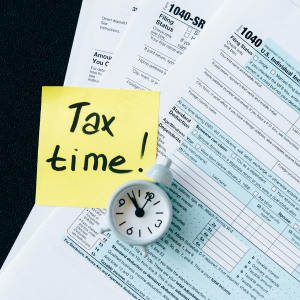
What Are the Consequences of Having Delinquent Property Taxes?

Can Delinquent Property Taxes Lead to Foreclosure?
There are a number of consequences that come with unpaid debt, such as foreclosure or delinquent taxes. In the state of Connecticut, having unpaid taxes could mean that a tax lien would be placed on your property. This lien permits foreclosure by local authorities if the debt remains unpaid. Understanding these facts is very important if you intend on protecting your home from being jeopardized by a Connecticut property tax foreclosure.
How Does Debt Affect Your Home Sale?
Unaddressed debts, mainly around property taxes, could make it difficult to sell your house. Property taxes will have to be resolved prior to closing on any sale, as transactions involving the title of the property will be severely impacted. Home sellers need to be cognizant of the fact that unpaid taxes will make it difficult to sell the property. Resolving the debts prior to the sale will help streamline the sale of the property.
What Happens If You Ignore Tax Liens?
Ignoring a tax lien can escalate into more severe issues. A tax lien can escalate into a tax sale – a sale of your property due to unpaid taxes. This can be avoided if you resolve tax liens prior to attempting to sell your house. Ignoring tax liens not only jeopardizes your property but also complicates future transactions involving the release of tax liens during a house sale.
How Do Delinquent Property Taxes Affect Your Credit Score?

Is It Possible for Tax Liens to Impact Credit Reports?
Though tax liens are no longer visible on credit reports, they can still damage your credit score. Unpaid tax liens complicate the process of securing a loan or mortgage, as many lenders consider unpaid taxes a major risk. It is essential to devise smart strategies to manage unpaid taxes, particularly when preparing to sell the house.
Can Paying Off Tax Liens Improve Your Credit?
Although paying a tax lien does not immediately increase your credit score, it can improve your overall financial standing. It demonstrates responsibility when settling tax obligations, which creditors and lenders look favorably upon. Paying tax liens prior to selling property can improve creditworthiness.
How Long Do Tax Liens Stay on Your Record?
In Connecticut, tax liens are removed only after following certain processes. For example, after paying a delinquent tax, a waiting period during which the lien still impacts your record is mandatory. Understanding the mechanics of tax lien removal in Connecticut is essential for homeowners who want to enhance their standing in the real estate market.
At Valley Residential Group, we prioritize resolving property tax issues proactively to safeguard your financial well-being and your property interests.
What Are Your Options if You Can’t Pay Property Taxes in Connecticut?

Are There Payment Plans Available for Overdue Property Taxes?
There are also tax installment plans for paying property taxes in Connecticut. Such plans are generally offered by your local tax collector and assist in repaying tax debts. However, late property tax payments can impact your finances. Please make sure to assess the plans and their terms closely to determine if your finances allow.
Can You Negotiate Back Taxes with the Tax Collector?
Negotiation is possible with tax debt in Connecticut. Consider contacting the tax collector to discuss possible remediation. In basic terms, with some effort, property tax debt negotiation can result in an improved repayment process and fewer penalties. A fast response is critical. Resolving tax matters prior to selling your property is best, as it avoids numerous future hassles.
Is a Tax Amnesty Program an Option?
Connecticut does, at times, have tax amnesty programs for property taxes. Such programs are designed to aid taxpayers in settling outstanding debts by offering benefits like reduced penalties and interest. With tax relief, it can simplify settling some outstanding taxes for properties.
What Steps Can You Take Before Selling a House With Unpaid Taxes?

Do You Need to Clear Tax Liens Before Listing Your House?
As is often the case, yes, tax liens must usually be cleared prior to listing the house for sale. Tax liens usually hinder the interest of possible buyers and complicate sales. Consult the appropriate agencies concerning tax lien waivers for a house sale. How best to handle tax obligations after the property sale depends on this.
How Can Documenting Your Financial Situation Help?
Whenever your financial situation is well kept as a record, it will help clear away any issues involving overdue real estate taxes. Knowing how to arrange your records can help lower your taxes during the selling of the house.
Should You Consult a Real Estate Attorney?
Real estate lawyers are essential to consult in Connecticut, especially with complicated property tax matters. A property tax attorney can provide insightful legal assistance to help the homeowner understand how to pay taxes after selling the house. Legal assistance is important because it helps protect the seller and gives them useful advice.
To clear away any property tax issues while selling a house, all that is needed is to follow the correct steps with the assistance of a professional. Valley Residential Group encourages homeowners to follow the correct procedures to improve how property taxes are managed and the buying and selling of houses.
How Can You Market a House With Tax Liens Effectively?

Is It Better to Highlight or Conceal the Tax Issue?
Honesty should always be prioritized in real estate deals. Attempting to hide a lien could backfire. In Connecticut, where tax complications can occur, consider these points:
- Highlight the Opportunity: Being honest about the lien can attract investors who specialize in tax delinquent properties.
- Provide Solutions: Outlining a plan to handle or remove the lien post-sale will make buyers more comfortable with the purchase.
What Role Does Transparency Play in Sales?
Trust built with transparency enables one to avoid future conflicts and legal issues. Here’s how to manage tax liabilities when selling your home:
- Seek Legal Advice: Consult a property tax attorney in Connecticut. Their guidance will help you avoid costly tax complications.
- Clear Communication: Transparency around tax liabilities should be communicated to buyers. This will help instill trust rather than conceal it.
Can You Attract Buyers Willing to Deal With Tax Issues?
To appeal to prospective buyers willing to tackle tax liabilities, here is a refined plan:
- Market to Investors: Investors particularly care about distressed properties that come with tax debts in Connecticut. These buyers will probably accept the tax lien transfer if they get a lower price.
- Highlight Potential Gains: Investors need to see a viable ROI, and it’s prudent to show the possible ROI once tax issues are resolved.
What Are the Legal Implications of Selling a House with Delinquent Taxes?

When selling a house with tax debts, navigating the legal issues is crucial. Make sure procedures are in compliance with state regulations to avoid problematic legal outcomes.
Can You Sell Without Settling Tax Debts?
In Connecticut, it’s possible to sell with tax liabilities, but there are some complications:
- Negotiate Terms: A few buyers may be willing to buy the property and secure the tax liability, but this will require a safe means of legal agreements to protect all parties.
- Disclose Obligations: All tax obligations should be clearly defined prior so that no changes can be made after agreement is made.
What Legal Advice Should You Seek?
It is advisable to seek legal counsel for property tax issues:
- Consult a Property Tax Attorney: Consider hiring an attorney who specializes in Connecticut real estate tax lien law. They can assist you in mitigating the tax burdens on the sale.
- Understand State Requirements: Avoid adhering to the local tax compliance regulations to evade tax surprises during the closing.
How Does State Law Influence Your Selling Process?
It is obvious that tax obligations regarding the sale of the property in Connecticut is significantly influenced by the state law:
- Familiarize yourself with Connecticut Real Estate Tax Laws: Make full use of local regulations to avert illegal homeowner tax obligations.
- Plan for Compliance: Team up with legal experts to integrate state law obligations within your selling framework.
Selling a House with Tax Liens is a challenging endeavor for many. To effectively deal with the challenges while optimizing sale results, understanding these planning pointers is crucial. To receive a personalized quote on your property, reach out to Valley Residential Group.
What Are Alternative Selling Methods for Houses With Delinquent Taxes?

Can Short Sales Be Beneficial in This Scenario?
A short sale might be a good way to handle a home with delinquent taxes if you can’t pay the outstanding amount. In a short sale, you sell your property for less than what’s owed on the mortgage, but you need the lender’s approval. This approach can work well, especially for a distressed property sale in Connecticut. Talking to a property tax attorney in Connecticut can give you a clear picture of whether this option fits your needs.
What is a Deed-in-Lieu of Foreclosure?
Choosing a deed-in-lieu of foreclosure is another option. Here, you voluntarily hand over your home’s deed to the lender to avoid foreclosure. You must understand how Connecticut real estate tax laws affect this choice and the tax lien removal process in Connecticut. Knowing these terms helps you when thinking about this option.
Should You Consider Auctioning Your Property?
Auctioning your property may be a method to consider if you’re dealing with back taxes. A tax auction in Connecticut can lead to a faster sale, but often at a lower price. Be sure you understand the process of house sales delinquent taxes before deciding. It’s important to clarify everything about the property sale with back taxes to prevent any issues.
How Can You Evaluate Offers When Owing Property Taxes?

Once you explore different selling methods, evaluating offers is the next step. Here’s how to do it effectively.
Should You Prioritize Cash Offers?
Considering cash offers can be helpful, especially when selling with a tax lien, like in California. Cash deals often close faster and have a lower chance of falling through. If you’re selling with tax liability in Connecticut, cash offers might quickly clear your financial duties related to the property.
How Can Contingencies Affect the Offer?
Contingencies can change a house sale negotiation with tax debt. These are conditions that must be met for the sale to happen, which can complicate things if not handled properly. Working on managing tax liabilities when selling a home in Connecticut is important to avoid tax foreclosure. Know how contingencies could impact your situation.
What Financial Documents Should Be Reviewed?
Review the right financial documents carefully. Have all required paperwork related to property tax repayment in Connecticut. Looking at your income, outstanding debts, and necessary documents for a real estate tax sale in Connecticut will better prepare you for negotiations and decisions.
Exploring these options and evaluating offers thoroughly can help you choose the best way to sell a house with delinquent taxes. For more help, consider speaking with experts or advisors, like those from Valley Residential Group, who can offer personalized advice based on your circumstances.
What Role Do Real Estate Experts Play in Selling Homes with Tax Liens?

How Can Real Estate Professionals Assist in These Situations?
Selling a home with a tax lien can be tough, but real estate professionals are a big help. They know how to handle tax issues when selling and give smart advice to make the process smoother. A good real estate professional understands market challenges and acts as a bridge between buyers and sellers, helping to address concerns about liens. Their skills in setting a fair price and marketing the property can keep potential buyers interested, despite any tax problems.
Why Hire a Tax Consultant Before Selling?
Hiring a tax consultant before you sell your home is a wise choice. These experts focus on solving tax issues and can help clear tax liens before you list your house. They look at your financial details and provide solutions, making sure all tax matters are handled effectively. Taking this step not only makes selling easier but also boosts your property’s value. Working with a tax consultant helps avoid last-minute issues that might block a sale.
What Should You Look for in a Real Estate Attorney?
When dealing with legal matters like tax lien transfers, especially in Connecticut, having the right real estate attorney is crucial. An experienced attorney gives legal advice on these complicated issues and ensures that everything follows the law. Find an attorney who has successfully handled similar cases and can negotiate good terms while protecting your interests. Their knowledge of state rules is key to a smooth transfer process, so they are a vital part of selling your property.
What Are Some Strategies for Successfully Closing Deals with Tax Liens?
How Can Negotiation Skills Impact the Sale?
Good negotiation can make a big difference when selling a house with tax debt. Skilled negotiators find ways to balance what sellers want with what buyers worry about regarding tax liabilities. They can lead talks to find a deal that works for both sides, possibly lowering or reworking the tax debt as part of the agreement. By being good at negotiating, sellers improve their chances of getting the sale done, even with tricky tax situations.
Are There Tactics for Reducing Tax Obligations?
To cut down on tax obligations before selling, think about strategic steps. Tax debt negotiation is one way, involving working with authorities or creditors to reduce the tax amount owed. In Connecticut, property tax relief programs may also offer help to residents with large liabilities. It’s smart to check out these options carefully to lower the financial load and ease the sales process.
What Final Checks Should Be Made Before Closing?
Doing final checks before closing is very important. Make sure all tax liens are cleared to avoid future legal issues. This includes verifying that payments are made and getting official proof that liens are removed. At this stage, it’s helpful to work closely with your real estate professional, attorney, and tax consultant. This teamwork makes sure everything is in order, giving confidence and legal assurance as ownership changes hands.
FAQs:
Can You Sell a Home with Delinquent Taxes in Connecticut?
Yes, you can sell a home with delinquent taxes in Connecticut. However, you must deal with the tax lien during the sale to pass a clear title to the new owner.
What Happens If You Don’t Pay Property Taxes in Connecticut?
If you don’t pay property taxes in Connecticut, a lien could be placed on your property. This could lead to a tax deed sale or foreclosure by the local government if not resolved.
Is It Possible to Dispute a Tax Lien with the IRS or Local Government?
Yes, you can dispute a tax lien with the IRS or your local government if it’s incorrect. You need to provide proof and might have to negotiate terms.
How Can I Resolve Unpaid Real Estate Taxes Before Selling My Home?
You can resolve unpaid real estate taxes by setting up a payment plan with your city or paying off the debt before selling your house. This helps make the sale go smoothly.
What Are the Risks of Selling a Property with a Tax Lien?
Selling a property with a tax lien can be risky. It may scare off buyers and cause problems at closing unless the lien is cleared. Talking to a realtor can help handle these issues.
Can You Refinance a Home with Delinquent Taxes in Connecticut?
Refinancing when you have delinquent taxes is tough. Some lenders may allow it if you address the tax lien before or during the refinancing.
Can Previous Owners’ Tax Liens Affect Your Property?
Yes, tax liens from previous owners can affect your property. It’s important to ensure a lien is released when buying a property.
Is Investing in Properties with Tax Liens a Good Idea?
Investing in properties with tax liens can be profitable but needs careful research. Knowing local laws, like Connecticut’s rules on liens, is essential for wise decisions.
Key Insights
- In Connecticut, you can sell your home even with delinquent property taxes. Understanding the process is important.
- It’s best to resolve tax issues before selling. Homeowners should think about negotiating tax debt and exploring tax settlement options in Connecticut.
- You can sell your property with a tax lien by managing unpaid taxes and avoiding foreclosure. Municipalities may offer redemption periods for delinquent taxes.
- It is possible to dispute the tax lien with the IRS or other government entities, which could help ease the sale of your house with a tax burden.
- Handling a property’s delinquent real estate taxes involves understanding the lien release process and meeting homeowner tax obligations in Connecticut.
- For those considering refinancing, address back taxes before selling the property.
- Investigating the Connecticut statute of limitations on tax liabilities can show how they might affect selling a property.
- Releasing tax liens and resolving tax arrears are key steps to make a smooth transaction when selling with tax liability.
- Contacting experienced realtors and legal professionals can assist in handling Connecticut’s real estate tax complications during a property sale.
- Engaging in tax deed sales and understanding the implications for investors in markets like Michigan and Pennsylvania provides more context for Connecticut transactions.
This information applies to Connecticut and its cities, including Hartford, West Hartford, Meriden, Cheshire, and more. For more details, please call us at (860) 589-4663 or visit our website at Valley Residential Group LLC.


